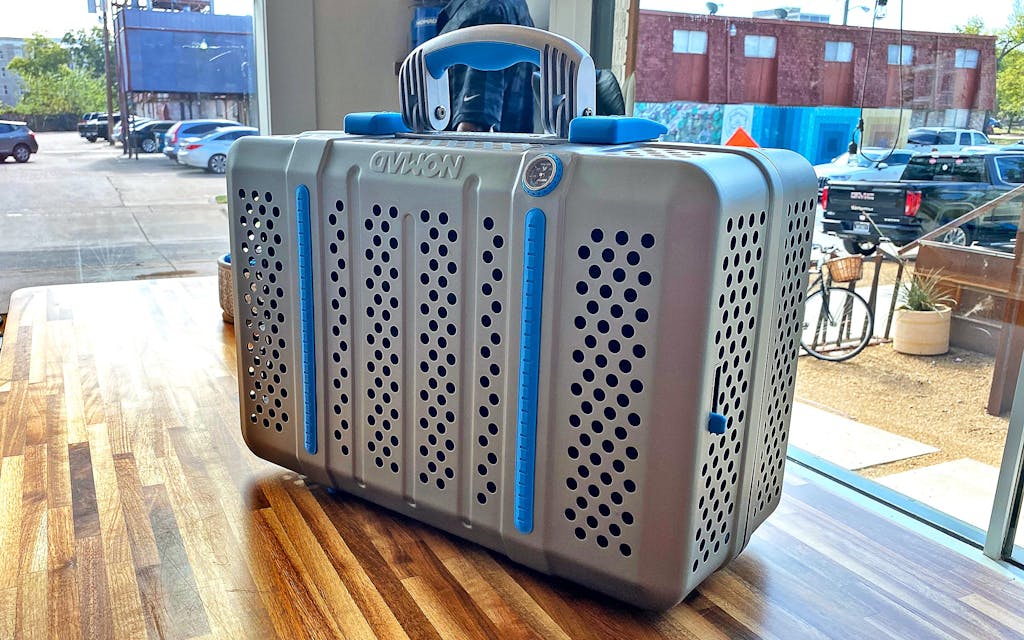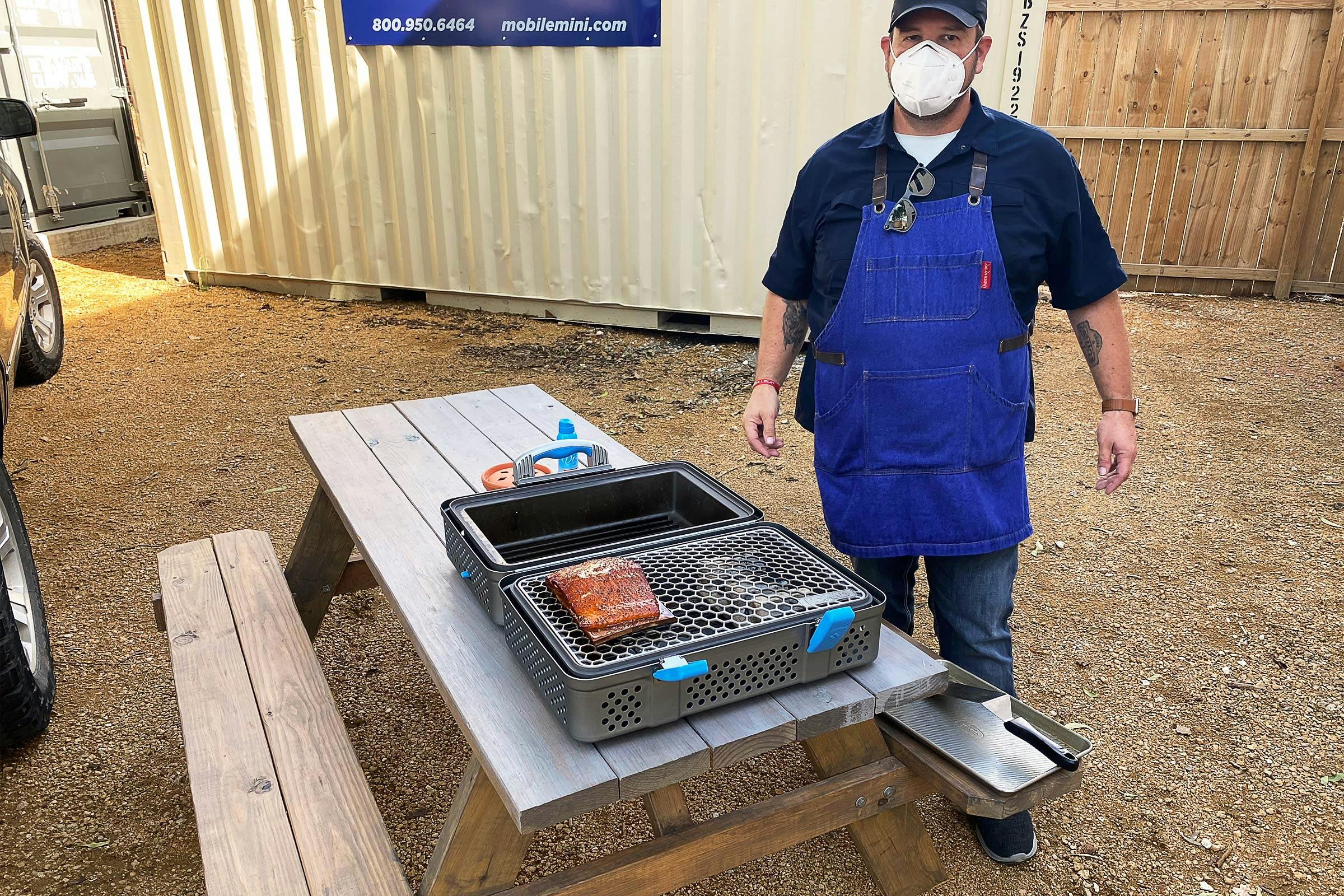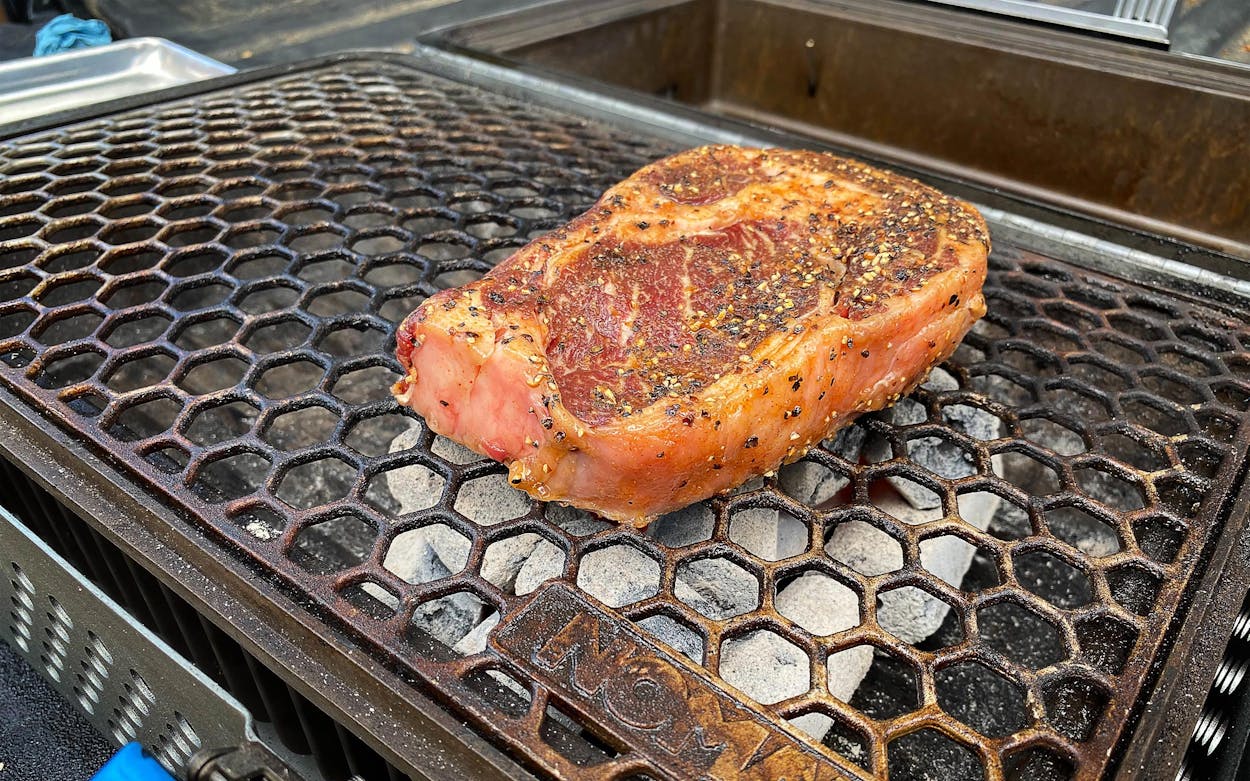Last week I dropped by the new Nomad Grills showroom in Dallas’s Oak Cliff neighborhood. The company’s founders, John Veatch and Cam Leggett, met me in a courtyard out back to show off the finer points of their newly launched portable grill. (They share the area with a few other businesses, including the Trompo taqueria.) At 10 a.m., the aroma of smoked salmon wafted through the air. Veatch and Leggett, both Dallas-area natives, did most of the talking, while letting pitmaster Doug Pickering do the cooking.
One of the two grills being used rested on a truck’s open tailgate as a ribeye sizzled on the grate, and another, with the salmon inside, was closed on a wooden picnic table. The Nomad team has done similar demos for plenty of small audiences, and the table showed no burn marks. “We haven’t burnt a wooden table,” Leggett said proudly. When closed, the outer layer of the grill was warm, but not hot, to the touch as the salmon smoked away inside. A burn scar on my forearm is a reminder that this isn’t the case with most backyard grills, but Veatch and Leggett set out three years ago to design a different kind of portable grill.
Veatch said he and Leggett noticed those who made portable grills were in “a race to the bottom.” The shelves of big-box stores were lined with inexpensive versions meant for single-season use, priced low enough to be left behind at the beach or the tailgate. The few high-quality versions weren’t truly portable, so Veatch and Leggett designed a highly functional grill that is portable and lightweight but also sturdy, and can sit on most any surface while in use.

The grill is really two distinct layers in a simple hinged box. It looks like a small suitcase that won’t hold water. The inner layer is a tough, cast aluminum grill body. In a demo on Instagram, you can watch the grill survive being driven over by a Jeep. The outer layer is a perforated, anodized aluminum shell, and there’s an air gap in between the two. It has no legs and doesn’t need any. With a normal load of lit charcoal in the grill, the outer shell gets up to only 140 degrees Fahrenheit, the temp of a steak cooked to medium. Veatch said he hasn’t seen the surface get any hotter than 170 degrees. At the end of the demo, Leggett closed the lid and the clasps while lit charcoal was still inside; then he carried it to the front seat of his truck. He said he’s done the same thing at football games to store the grill immediately after cooking, rather than risk it being stolen as it cools off outside, as you’d need to do with other portable grills.
When fully open, the grill has 425 square inches of cooking surface with both cooking grates in place (more than a 22-inch Weber kettle). It’s big enough to be your only grill, but Leggett stresses, “We’re not trying to kick anything else out of your yard. This is another tool.” Still, I could see how it would appeal to apartment-dwellers who don’t have many other compact grilling options. Given its steep price ($600), the Nomad is no small investment to be just another backyard toy—but Veatch and Leggett are betting that consumers will be willing to pay more for a high-quality, long-lasting product.
As for fuel, Veatch and Leggett want you to use their proprietary charcoal. It’s made in Thailand from rambutan wood, and will go on sale later this month. In the meantime, they suggest using Thaan charcoal made for the Pok Pok restaurant group, or binchotan charcoal. Briquettes and lump charcoal will work in the Nomad grill—but the former leaves behind a lot of ash, while the latter pops and sparks more than the company’s own charcoal.

Nomad Grills went from concept to reality when the first crate of one thousand grills arrived from China in July. The founders are aiming to sell five thousand in the first year. You can pick one up at the showroom in Dallas or order it online. Nomad ships for free to the lower 48, but the business has already received orders from Japan, Sweden, and the United Kingdom. The $600 price tag includes the grill and a single grate; if you want to double the cooking surface, you’ll need to shell out $120 for another grate. There’s only one color scheme for now, but they’re already working on burnt orange, black and red, and maroon color schemes. Maybe those will be ready just in time for the 2021 college football tailgating season.
Nomad Grills
111 N. Bishop Avenue, Suite A, Dallas
Contact: Hello@NomadGrills.com
Hours: Monday–Friday, 10 a.m.–4 p.m.








